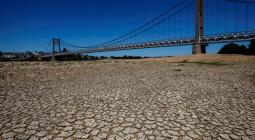There’s no such thing as ‘freak’ weather any more – and 2023 already looks like a disaster movie

As Storm Elliott rages and 2022 is declared the UK’s warmest year yet, why are leaders still in denial about extreme weather?
The 2004 film The Day After Tomorrow was based on the idea that the main north Atlantic Ocean current could slow and then reverse, superstorms would flash-freeze the northern hemisphere and a new ice age would abruptly descend. It was dismissed as “profoundly silly”, “a ludicrous popcorn thriller” informed by “lousy science”, and some scientists argued it depicted meteorological phenomena “as occurring over days, instead of decades or centuries”.
Storm Elliott, the “bomb cyclone” that hit the US over the holidays, should have made some of those critics uncomfortable. Temperatures in places plunged in just a few minutes as one of the greatest North American storms ever recorded swept down from the Arctic to Mexico, sometimes at hurricane speed. It brought death, chaos and misery for tens of millions of people.
Fierce Christmas storms and bomb cyclones are not that unusual in the US but Elliott was remarkable chiefly for its continental scale, lightning speed and intensity. Scientists have yet to calculate the degree to which it might be linked to human actions and increased CO2 levels, but it clearly fits the IPCC’s widely predicted pattern of climate intensification and unprecedented global heat, cold and atmospheric turbulence.
Less noticed than Storm Elliott but possibly just as significant were the disastrous Christmas floods in the Philippines and Brazil, and the worryingly warm holiday period experienced across much of Europe in the past 10 days. Temperatures of more than 26C were recorded in France, Spain and Italy, with many Alpine ski resorts closed for lack of snow as rain fell and temperatures climbed 15C above normal. Traditionally, it’s Australians who spend Christmas on the beach. Soon it might be anyone.
The cyclone bomb rounded off a year that rewrote climate history. It was not just one of the hottest years on record, but also one of the driest in many countries, with nearly every week bringing some new climate-related disaster. Starting with Storm Eunice in February, which battered northern Europe, immense floods, droughts and storms hit Pakistan, India, China, Australia, southern Africa and the US. Crops failed in unprecedented heatwaves and hundreds of thousands of people were made homeless in both rich and poor countries. Temperature records stretching back hundreds of years were broken in the UK, Italy, France and Spain.
Next year is widely predicted by meteorologists to bring more of the same intensification of weather. The Met Office says 2022 will be the newest warmest year on record. Greenland’s glaciers have been found to be melting far faster than previously thought, heatwaves are becoming more common and storms are expected to become more powerful as the oceans continue to warm.
But while 2022 may have been the year that more people than ever experienced what used to be termed “freak” weather, it was yet another year lost when it comes to governments acting. What Storm Elliott and all the droughts, floods and extreme climate events show is that we are physically, mentally and financially unprepared for what is certain to come. Christian Aid this week estimated that 2022’s 10 worst climate disasters alone cost more than $165bn, but that is likely to be nothing if action to adapt our infrastructure and economies is not taken urgently.
Even as Storm Elliott devastated parts of the US, it must have occurred to many governments in the rich northern hemisphere that the climate crisis is helping to supercharge the weather and that something similar or worse could just as easily happen in their countries.
But the rich world has utterly failed to adapt to the changes taking place, and it will now cost far more than it need have done. Only a handful of countries – mostly those on the frontline of climate chaos like Bangladesh – have even begun to try to adapt to the approaching chaos and tragedy. Cop27 in Egypt may have finally launched a global loss and damage fund to help poor nations adapt, but no money has been pledged and, judging from experience, is likely to come soon.
All we know is that major adverse weather events such as Elliott are likely to grow in number, scale and frequency. That means big decisions must be taken now on how to adapt our investments, housing, farming, food, transport, health and energy systems.
Governments cannot avoid the climate crisis any longer. We must become accustomed to this new reality and be prepared. We have no choice now; everything must change.
-
John Vidal was the Guardian’s environment editor. He is the author of McLibel: Burger Culture on Trial
COVER PHOTO: Storm Elliott in the US was remarkable chiefly for its continental scale, lightning speed and intensity.’ Photograph: Joed Viera/AFP/Getty Images





